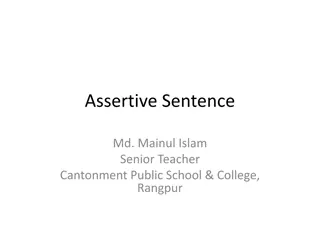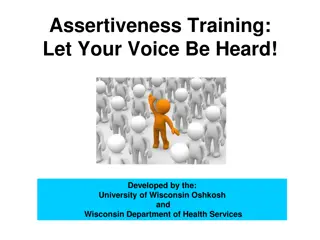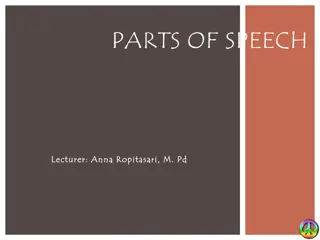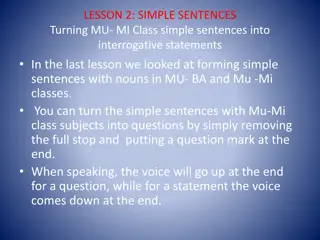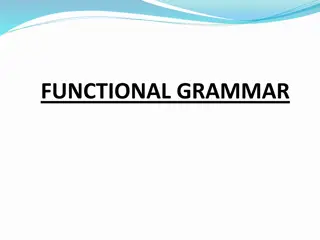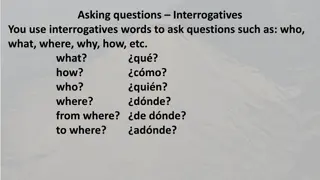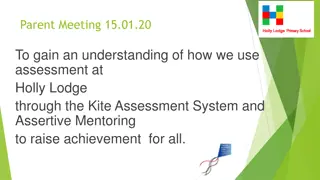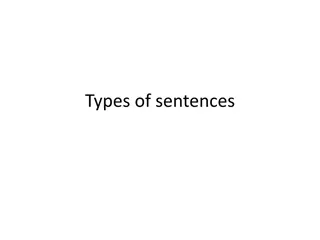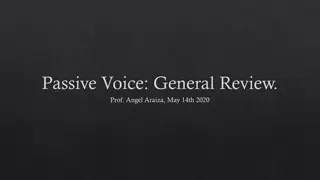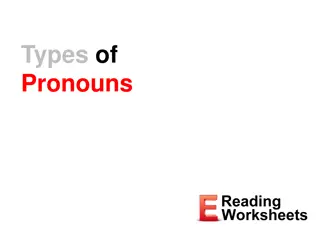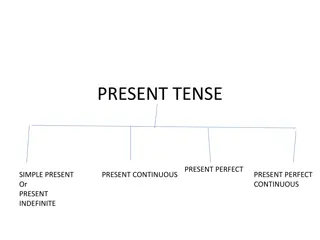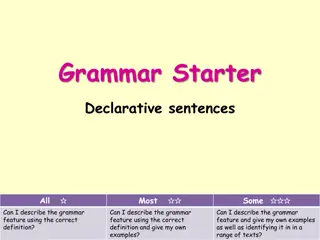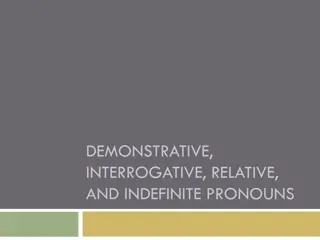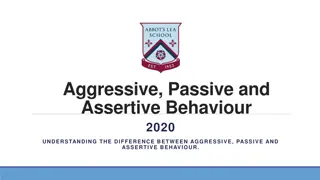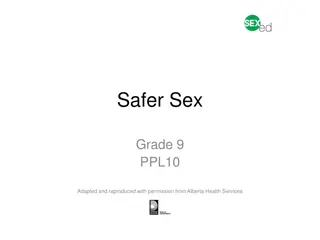Mastering Assertive to Exclamatory Sentences: A Comprehensive Guide
Dive into the world of changing sentence structures with a focus on transforming assertive sentences to exclamatory ones. Explore the importance of using exclamatory sentences to express strong emotions and learn various examples and models to enhance your understanding and mastery of this skill.
2 views • 25 slides
Sentence Transformation Guidelines and Exercises for B.A. II Semester English
Understand the concept of sentence transformation to alter sentence forms without changing meanings. Learn various types of transformations like affirmative to negative, interrogative to assertive, and more. Practice exercises provided for hands-on learning.
1 views • 11 slides
Assertive to Interrogative: English Grammar Exercises and Practice
Enhance your English grammar skills with exercises on changing assertive sentences into interrogative ones. Learn how to transform sentences using auxiliary verbs, modal verbs, and without auxiliary verbs through practical examples and practice questions. Improve your sentence structure and comprehe
2 views • 24 slides
Understanding Present vs. Past Tenses in English Grammar
Exploring the basics of present and past tenses in English grammar, covering affirmative, negative, and interrogative structures, as well as adverbs of frequency and quantity. Learn about describing general facts, habitual actions, and specific past events through detailed examples and visual aids.
8 views • 13 slides
Understanding Sentence Types and Structure
Explore the types of sentences - Assertive, Interrogative, Declarative, Imperative, and Exclamative, each serving a unique purpose in communication. Learn about sentence patterns, word order, and examples for better comprehension.
4 views • 8 slides
Assertiveness Training: Let Your Voice Be Heard
Assertiveness Training: Let Your Voice Be Heard is a program developed by the University of Wisconsin Oshkosh and Wisconsin Department of Health Services. It focuses on understanding the difference between passive, aggressive, and assertive communication techniques, learning to use assertive techniq
0 views • 9 slides
English Transformation Rules: Assertive to Interrogative with Examples
Learn the rules of transforming assertive sentences into interrogative sentences in English grammar. Understand the different scenarios and examples for the transformation process. Enhance your skills in using interrogative sentences in various situations while maintaining the original meaning. Dive
1 views • 23 slides
Daily Grammar Review Challenges for Grade 8 Students
Engage in a week-by-week grammar review for 8th-grade students. The lessons consist of identifying declarative or interrogative sentences, punctuating sentences with periods or question marks, and distinguishing between exclamatory and imperative sentences. Enhance your grammar skills with daily exe
1 views • 61 slides
Enhancing English Writing Skills through Sentence Transformations
Practice sentence transformations in English to improve writing skills. Learn how to change sentence structures according to specific directions. Develop proficiency in forming complex, negative, passive, interrogative, and other types of sentences. Enhance comprehension and expression for S.S.C exa
1 views • 16 slides
Understanding Mood and Modality in Morphosyntax with Prof. John Corbett
Today's session with Prof. John Corbett explores the final three sets of grammatical categories related to verbs: mood (fact or non-fact), modality (speaker's stance), and voice (subject's role). The session delves into the present-day English mood system, differentiating between various realization
1 views • 24 slides
Understanding Parts of Speech: Nouns and Pronouns Overview
Dive into the world of nouns and pronouns with this detailed guide covering definitions, examples, and practice exercises on common nouns, proper nouns, and different types of pronouns such as personal, demonstrative, and interrogative pronouns.
1 views • 19 slides
Forming Interrogative Statements in Luganda with MU-MI Class Subjects
Learn how to turn simple sentences with MU-MI class subjects into interrogative statements in Luganda by replacing the full stop with a question mark. Understand the changes in prefixes when forming questions, such as 'g' to 'gy' and 'gu' to 'gwa'. Practice examples and grasp the rules for creating
0 views • 10 slides
Understanding Functional Grammar: Nouns, Pronouns, and Punctuation
Functional grammar involves understanding the parts of speech, such as nouns and pronouns, along with proper punctuation usage. Explore the different kinds of nouns like proper, common, collective, material, and abstract. Learn about the various types of pronouns including personal, reflexive, relat
0 views • 39 slides
Transformation of Sentences in English: Practice Questions and Answers
These practice questions and answers focus on transforming sentences in English. The exercises cover various sentence structures such as positive, negative, interrogative, complex, passive, superlative, and more. By changing sentences as directed, you can enhance your understanding of sentence trans
0 views • 7 slides
Understanding Different Types of Sentences
Learn about the four types of sentences - Assertive, Imperative, Interrogative, and Exclamatory. Understand their characteristics and see examples to identify each type correctly. Enhance your knowledge of sentence structure and punctuation rules.
0 views • 8 slides
Understanding Rules of Narration in English | Teacher Mohammad Harun
Explore the rules of narration in English, learn about changing speech from direct to indirect, and understand how to apply these rules through examples provided by senior teacher Mohammad Harun at Golam Bari Govt. High School. Get insights on assertive, interrogative, and imperative sentences in re
0 views • 19 slides
Spanish Interrogatives: Asking Questions and Sentence Structure
Interrogative words in Spanish are used to ask questions, such as who, what, where, why, and how. When forming questions, the verb is placed before the subject in Spanish. Additionally, the placement of interrogatives changes when asking for confirmation or denial. Learn more about asking how much a
0 views • 6 slides
Weather Transformations: Yesterday's Conditions and Present Tense Conversions
Explore different weather conditions from yesterday and convert sentences into negative, interrogative forms, and Simple Present tense. From cold and snowy days to hot and stormy nights, practice transforming sentences in different contexts.
0 views • 10 slides
Transformation of Exclamatory Sentences to Assertive: Rules and Examples
Learn how to transform exclamatory sentences into assertive sentences with clear rules and examples. Find out how to change the tone from enthusiastic or emotional to more straightforward and factual.
0 views • 11 slides
Enhancing Achievement Through Assessment at Holly Lodge: Kite Assessment System & Assertive Mentoring
Gain insight into how assessment strategies at Holly Lodge, including the Kite Assessment System and Assertive Mentoring, are utilized to elevate student achievement. Explore robust target setting, targeted teaching, progress tracking, and child-inclusive goal setting to support student success. The
0 views • 15 slides
Understanding the Four Types of Sentences
Declarative, imperative, interrogative, and exclamatory sentences each serve a unique purpose in communication. Declarative sentences state facts, imperatives give commands, interrogatives ask questions, and exclamatory sentences express strong emotions. By recognizing the characteristics of each ty
0 views • 18 slides
Health Education Unit Overview
This educational unit focuses on identifying and using different illnesses, practicing the interrogative form of present continuous tense, and enhancing listening, speaking, and writing abilities. Students will learn about various common illnesses and how to form interrogative sentences in the prese
0 views • 10 slides
Simple Present Tense: Usage, Formation, and Spelling Rules
Explore the Simple Present Tense through daily routines, affirmative statements, formation rules for different pronouns, spelling guidelines for adding final -s, and forming interrogative sentences. Understand how to express habits, truths, and routines in English using clear examples and explanatio
0 views • 12 slides
English 2nd Paper Class for HSC/Alim - Assertive, Interrogative, Exclamatory Sentences Practice
Join Sabina Yeasmin's English 2nd Paper class at Baridhara Nazmul Ulum Alim Madrasah, Dhaka for HSC/Alim students. Practice converting assertive to exclamatory and interrogative sentences. Explore examples like "Anger is nothing but a vice" transformed to "Is anger anything but a vice?" Learn how to
0 views • 11 slides
Understanding Speech Act Theory and Pragmatics Tutorial
Dive into the intricacies of speech act theory with a focus on direct and indirect speech acts, illocutionary and perlocutionary forces, and performative verbs. Explore various linguistic forms including interrogative and declarative structures to understand how language can be used to convey intent
0 views • 35 slides
Understanding the Present Perfect Tense for Describing Life Experiences
Explore the uses of the Present Perfect tense to discuss life experiences without specifying a date or time. Learn how to form positive, negative, and interrogative sentences, using examples like traveling abroad, riding a horse, and more. Discover how to express having had or never had certain expe
0 views • 11 slides
Understanding Passive Voice and Verbal Times
Passive voice focuses on the object of the sentence, with examples of converting sentences from active to passive voice in different verbal tenses. It explains the concept of subject giving an object in active voice and the reception of the object in passive voice. The importance of subject in a sen
0 views • 9 slides
Assertiveness Training for Stephen Minister: Relating Gently and Firmly
Learn about assertiveness training for Stephen Ministers in Module 6, where topics include responding to care receiver requests, making assertive requests, and skill practice for making and responding to requests. Explore the experiences of being assertive, the challenges faced, and the importance o
0 views • 21 slides
Understanding Different Types of Pronouns
Learn about the seven types of pronouns - Personal, Possessive, Reflexive, Relative, Demonstrative, Indefinite, Interrogative. Personal pronouns replace nouns, possessive pronouns replace possessive nouns, reflexive pronouns refer back to the subject, relative pronouns introduce relative clauses, an
0 views • 16 slides
Understanding Simple Present Tense and Its Usages
Simple Present Tense is used for habits, routines, and permanent truths. This tense follows a specific structure for positive, negative, and interrogative sentences. Through examples and exercises, learn how to correctly use Simple Present Tense in everyday conversations.
0 views • 8 slides
Examples of Declarative and Interrogative Sentences
Explore examples of declarative and interrogative sentences, understand their definitions, and learn to convert questions into statements. Dive into various texts to identify these sentence types and enhance your grammar skills.
0 views • 5 slides
Mastering Quranic Arabic: Surah Baqrah and Interrogative Particles
Dive into Surah Baqrah verses 14-15 as we explore their meanings, alongside a study of Interrogative Particles in Arabic grammar. Prepare to reflect on the deeper teachings during your next salah.
0 views • 65 slides
Mastering Transformation of Sentences in English Classroom
Explore the four essential steps to transform sentences - from assertive and interrogative to imperative and exclamatory. Learn about sentence types like simple, complex, and compound along with active and passive voices. Practice converting sentences through examples provided by Assistant Teacher J
0 views • 13 slides
Understanding Demonstrative, Interrogative, Relative, and Indefinite Pronouns
Demonstrative pronouns point out specific people, places, things, or ideas. They include "this," "that," "these," and "those." Interrogative pronouns introduce questions and include "what," "which," "who," "whom," and "whose." Understanding the usage of these pronouns is essential in forming clear a
0 views • 21 slides
Understanding Aggressive, Passive, and Assertive Behavior in 2020
Aggressive behavior is reactionary and impulsive, often leading to rule-breaking and violence. Passive behavior involves failing to express thoughts and feelings, allowing others to disregard your rights. Assertive behavior means standing up for your rights in a calm and positive manner, without bei
0 views • 11 slides
Building Assertiveness Skills: A Guide to Effective Communication
Explore the concept of assertiveness, learn what it means to be an assertive person, and discover the characteristics of assertive individuals. This guide provides practical tips on how to become more assertive, including strategies for open communication, active listening, and conflict resolution.
0 views • 15 slides
Safer Sex Practices and Assertive Communication Techniques for Teens
Explore safer sex practices such as abstinence, limiting partners, and proper contraceptive use to reduce risks of STIs, pregnancy, and emotional impacts. Learn about passive, aggressive, and assertive communication styles, emphasizing the importance of assertive communication in expressing feelings
0 views • 9 slides
Transformation of Sentences into Assertive and Exclamatory Forms
Learn how to transform assertive sentences into exclamatory form and vice versa through examples and visual aids. Explore the rules and structures behind these sentence transformations to enhance your writing skills.
0 views • 9 slides
Examples of Assertive to Exclamatory Sentences in English
Explore examples of transforming assertive sentences into exclamatory sentences in English. Practice converting statements to exclamations to enhance your language skills. Understand the nuances of sentence structure and punctuation to effectively convey emotions and emphasis.
0 views • 13 slides
Enhancing Confidence and Assertiveness in Employability Skills
Understanding the concepts of confidence and assertiveness is crucial in developing employability skills. Assertiveness involves standing up for oneself while respecting others. Tips for gaining confidence include visualization, self-affirmation, facing fears daily, and challenging your inner critic
0 views • 7 slides




